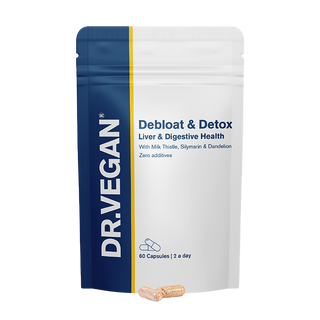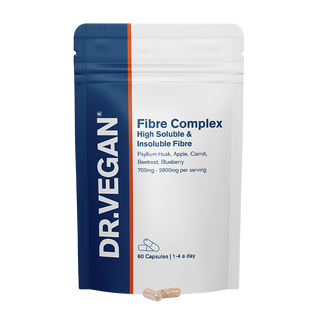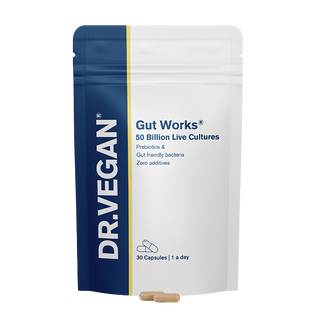5 ways to improve constipation

50% of us are affected by poor digestion and bloating, with constipation, infrequent bowel movements, or hard and dry stools that are difficult to pass a common cause or symptom.
Regular bowel movements are essential for our daily wellbeing – our gut controls 70% of our immune system and is vital for our brain health, energy, skin and much more – so regular stools are important to excrete toxins and bad bacteria through our poo. Here, our expert nutritionists share five tips and changes to relieve persistent constipation.
What is constipation?
Constipation means you’re not able to empty your bowels regularly or efficiently. You may have wondered what is a normal amount to poo each day. Some people poo a few times a day, some once a day, there isn’t a strict 'good' or 'bad' normal frequency of bowel movements. However, infrequent passing of stools is not healthy and in medical terms, you’re considered to be suffering constipation when you have three or fewer bowel movements in a week.
Constipation can be a symptom of diverticulitis, learn about the causes and treatments of diverticulitis.
What's your diet missing? Create your free Diet Profile.
What causes constipation?
The most common causes of constipation are related to lifestyle, diet itself as well as changes in your diet. Eating too little fibre in your diet, drinking too little fluid, not exercising enough or a change in your normal exercise routine are all common causes of constipation.
Stress, hormones and medications can also cause constipation. For women, hormone changes before your period increase the level of progesterone in your body which relaxes your muscles, making bowel movements more difficult. This is why poo changes at certain points of the menstrual cycle such as during a woman's period. Learn more in 'What is period poo?'.
Stress affects the hormones in our gut, slowing down digestion, and leading to an overload of bad bacteria and an unhealthy gut. Certain medications such as antidepressants, indigestion medications and codeine are also well known to lead to constipation.
Debloat & Detox

5 ways to relieve constipation
1. Drink more fluids
Staying hydrated is essential for normal bowel movements and dehydration is among the most common causes of constipation. Water helps lubricate our digestive system and softens our stools, so you should aim to drink at least one and a half litres of water a day. Also try to avoid drinks that can dehydrate you such as alcohol and caffeine, you may enjoy a simple smoothie or a ginger tea to support immunity as well as hydration instead.
Learn more in 'What colour should urine be' and you may also enjoy 'How to naturally improve digestion'.
You might hear people say a cup of coffee can stimulate your stools, however there isn't any clinical evidence of this, and there is more evidence of the dehydration effect of coffee that can cause constipation and increase the risk of IBS symptoms.
2. Eat more fibre
Having sufficient fibre in our diet is vital for our gut health and regular bowel movements. Fibre helps absorb water into our colon, increasing the bulk and weight of our stools and softening them. It may sound counter-intuitive but a larger poo is easier for your body to pass. Learn about the 7 different types of poo in 'What does your poo say about your health'.
There are two types of fibre. Insoluble fibres, found in wholegrains and vegetables, are good for constipation because they add bulk to your stools, helping them pass more quickly. Soluble fibres, which are found in bran, nuts, seeks, lentils and peas, absorb water which softens your stools and improves consistency. To increase your fibre intake, reach for wholegrains, nuts and seeds, psyllium, and lots of fruit and veg. Not sure if you need a fibre supplement? Our expert nutritionists explain how to know if you need a fibre supplement.
3. Exercise
Numerous studies have shown exercise can help relieve symptoms of constipation and likewise, a sedentary lifestyle increases the risk of constipation.
Whether it is regular walking, brisk walks, a gentle jog or a bike ride, 30 minutes of daily exercise helps keep your stools regular.
4. Avoid FODMAPs
FODMAPs are short-chain carbohydrates found in foods which are not easily digested by your body. When FODMAPs sit in your intestines, your gut bacteria feed on these foods which can cause gas and digestive symptoms including bloating, constipation and diarrhoea for those with sensitive stomachs. You may also enjoy 'Common reasons you might be bloated'.
FODMAPs include fructose, lactose, fructans and galactans, and they’re found in various vegetables, dairy products, apples, broccoli, lentils, wheat, rye and barley. While some of these foods can be excellent sources of fibre to relieve constipation, people with sensitive stomachs may find they actually make their symptoms worse, so try eliminating FODMAP foods one at a time from your diet.
5. Take a probiotic supplement
Probiotic supplements can help relieve constipation. The good bacteria in our gut support a process called ‘peristalsis’, which is the contraction and relaxation of the intestinal walls. This process helps move food along by producing acidic substances such as ‘lactic acid’ and ‘butyric acid’ that gently decrease the pH level in the colon. As a result, one reason for constipation can be a low number of good bacteria in the gut, so taking a high quality probiotic supplement can help.
One clinical trial including yoghurt with added probiotics ‘Bifidobacterium lactis’ and ‘Lactobacillus casei’ improved transit time of food through the digestive tract and reduced abdominal bloating.
In summary
You don't have to let constipation get on top of you and following these steps should relieve symptoms for most people. However if you continue to suffer constipation and painful symptoms, do go and speak with your GP who can conduct further tests.
View our range of vegan probiotics, vitamins and supplements.
*This article contains data from UK surveys conducted by DR.VEGAN®. All survey findings reflect our own research efforts and have not been influenced or verified by any external organisations or third-party entities.
Want to hear more from our nutritionists? Sign up to our free newsletter:



















